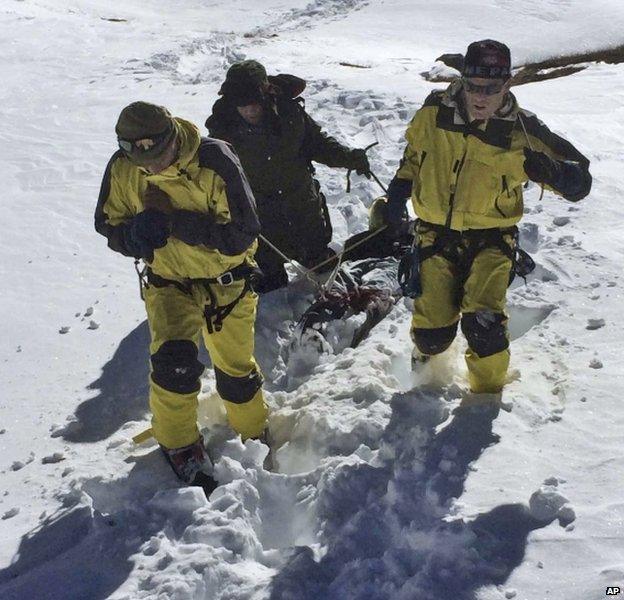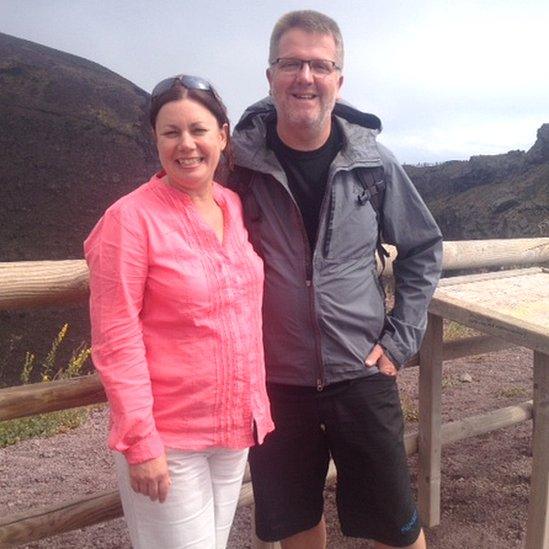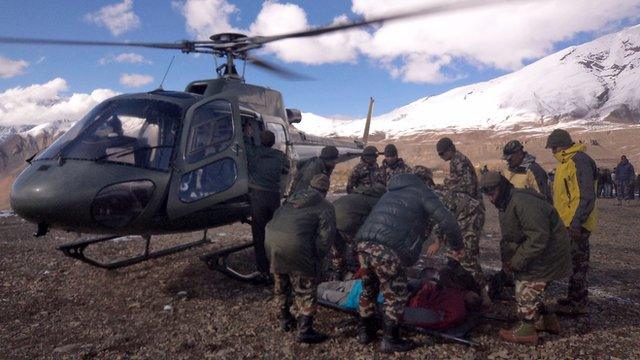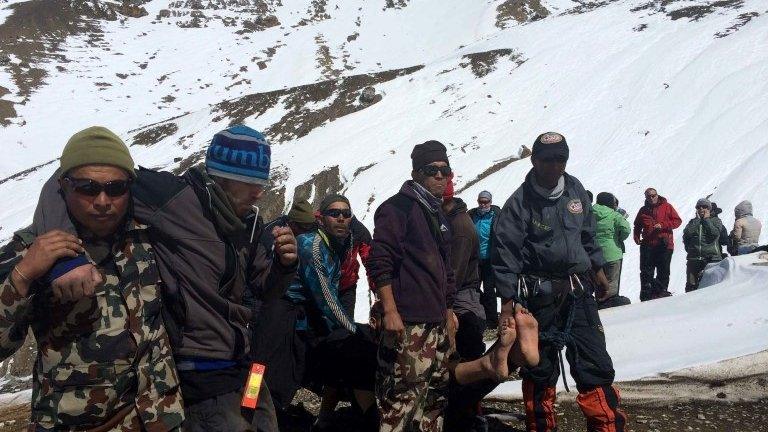Nepal blizzards: Trekkers 'herded to deaths', claims survivor
- Published
![Sgt Paul Sherridan [left] and Steve Wilson in the Himalayas](https://ichef.bbci.co.uk/ace/standard/624/mcs/media/images/78303000/jpg/_78303310_sherridan2.jpg)
Sgt Paul Sherridan [right] and lifelong friend Steve Wilson pictured earlier on their trip
A British survivor of a Himalayan storm which killed at least 29 people has claimed trekkers were "herded to their deaths" by ill-equipped guides.
Paul Sherridan, 49, a police sergeant from Doncaster, was among 230 trekkers who escaped Wednesday's blizzards and avalanches in Nepal's Annapurna range.
He said a bad weather forecast meant they should have been prevented from going up the mountain.
"They were herded up that mountain to their death," he told BBC Radio 4.
Most of the deaths happened when a blizzard hit a point on the Annapurna Circuit, a well-known trekking route in central Nepal.
The bad weather hit a resting place 4,500m (14,800ft) above sea level, not far below the circuit's highest point, the Thorung La pass.
Rescuers are still searching the range looking for more survivors, who are believed to be stranded in lodges and huts. Hiking remains difficult because of waist-deep snow.
'Disgusting folly'
The Nepalese government has announced a high-level committee with two senior ministers to monitor and co-ordinate rescue efforts, in what is expected to be the country's worst mountaineering tragedy.
Mr Sherridan, of Harlington, near Doncaster, South Yorkshire, was half way through a month-long trip with his lifelong friend Steve Wilson when the storm struck.
He said: "My view is that this incident could have been prevented. I knew the weather forecast before I set off.
"Having spoken to my guide, who wasn't there but obviously has been there, they say that the weight that the porters carry is so great that they leave their own personal safety equipment behind to lighten their load. That to me is an absolute disgusting folly.
"All they are doing is leading people to a certain death, and themselves.

Rescue team members carried an avalanche victim before the body was airlifted from Thorung La pas
"If someone had taken the responsibility just to stop people going up there, I'm sure the fatalities would have been a lot less."
He said walkers were left stumbling through "an abyss of nothing" as dense snow left them unable to orient themselves.
"Somebody shouted - and I believe it was one of the guides - 'Move forwards. Move forwards," said Mr Sherridan.
"But as we moved forwards, conditions worsened and we became involved in blacked-out conditions where the ground became the same colour as the sky and it was difficult to see which way was up and which way was down.
Paul Sherridan: "I looked at a boy and his face was frozen"
"As I descended this abyss of nothing, I realised that the people I was following didn't know where they were. It was at that point that I realised I had gone from a place of safety into an absolute position of fear and sheer terror."
He said it was only when he glimpsed a pole through the white-out that he was able to find a route to safety.
"We picked our way down for two hours through this maze of poles that sometimes we couldn't see for minutes on end, but it seemed to bring some sort of calmness and order to affairs.
"It was around that time that I heard the rumble of an avalanche and I heard the large thunder and roar of snow falling and I just knew, due to the number of people, that there were going to be fatalities. It was horrific."
Mr Sherridan's daughter Hannah, 23, said her father and Mr Wilson had planned the trekking trip to celebrate turning 50 next year.
"They'd wanted to do this all their lives, it was a trip of a lifetime," she said.
"Now I'm just looking forward so much to having him back."

Sgt Paul Sherridan, pictured with his wife Lesley, was celebrating his impending 50th birthday
- Published17 October 2014

- Published17 October 2014
